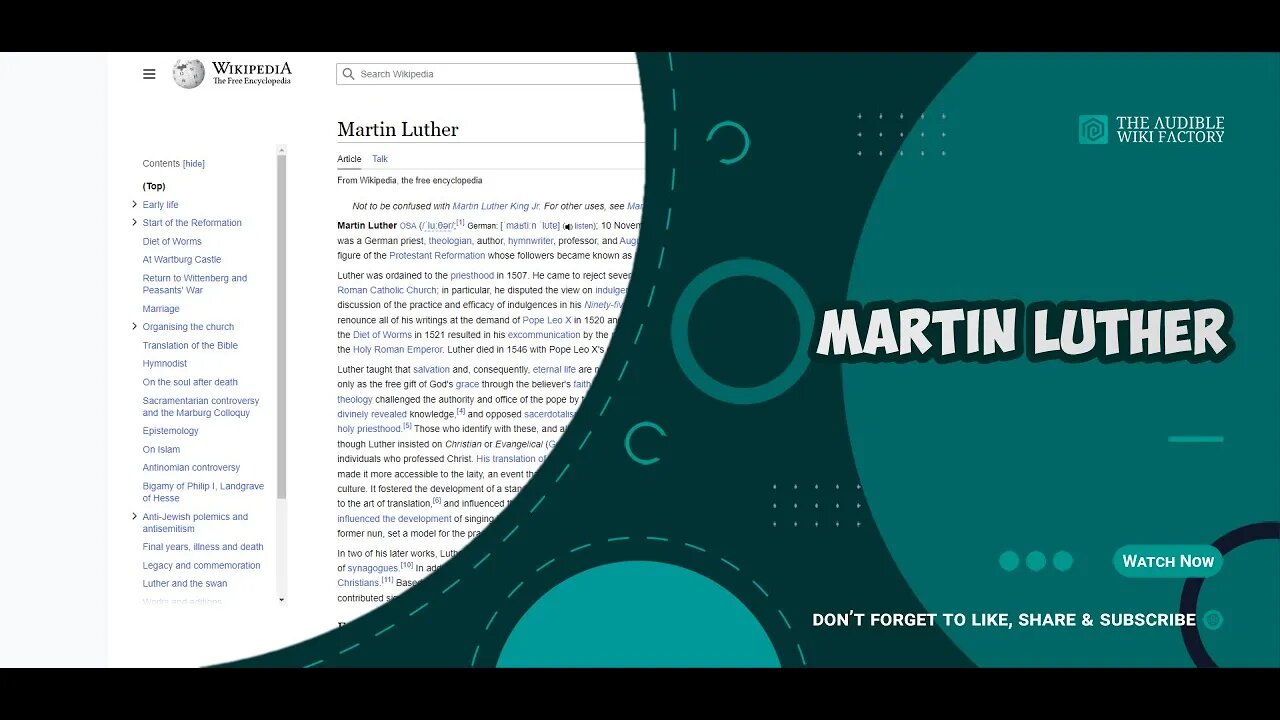Premium Only Content

Martin Luther was a German priest, theologian, author, hymnwriter, professor, and Augustinian
Martin Luther was a German priest, theologian, author, hymnwriter, professor, and Augustinian friar. He is the seminal figure of the Protestant Reformation whose followers became known as Lutherans.
Luther was ordained to the priesthood in 1507. He came to reject several teachings and practices of the Roman Catholic Church; in particular, he disputed the view on indulgences. Luther proposed an academic discussion of the practice and efficacy of indulgences in his Ninety-five Theses of 1517. His refusal to renounce all of his writings at the demand of Pope Leo X in 1520 and the Holy Roman Emperor Charles V at the Diet of Worms in 1521 resulted in his excommunication by the pope and condemnation as an outlaw by the Holy Roman Emperor. Luther died in 1546 with Pope Leo X's excommunication still in effect.
Luther taught that salvation and, consequently, eternal life are not earned by good deeds but are received only as the free gift of God's grace through the believer's faith in Jesus Christ as redeemer from sin. His theology challenged the authority and office of the pope by teaching that the Bible is the only source of divinely revealed knowledge, and opposed sacerdotalism by considering all baptized Christians to be a holy priesthood. Those who identify with these, and all of Luther's wider teachings, are called Lutherans, though Luther insisted on Christian or Evangelical (German: evangelisch) as the only acceptable names for individuals who professed Christ. His translation of the Bible into the German vernacular (instead of Latin) made it more accessible to the laity, an event that had a tremendous impact on both the church and German culture. It fostered the development of a standard version of the German language, added several principles to the art of translation, and influenced the writing of an English translation, the Tyndale Bible. His hymns influenced the development of singing in Protestant churches. His marriage to Katharina von Bora, a former nun, set a model for the practice of clerical marriage, allowing Protestant clergy to marry.
In two of his later works, Luther expressed anti-Judaistic views, calling for the expulsion of Jews and burning of synagogues. In addition, these works also targeted Roman Catholics, Anabaptists, and nontrinitarian Christians. Based upon his teachings, the prevailing view among historians is that his rhetoric contributed significantly to the development of antisemitism in Germany and of the Nazi Party.
BIRTH AND EDUCATION
Martin Luther was born to Hans Luder (or Ludher, later Luther) and his wife Margarethe (née Lindemann) on 10 November 1483 in Eisleben, County of Mansfeld, in the Holy Roman Empire. Luther was baptized the next morning on the feast day of St. Martin of Tours. In 1484, his family moved to Mansfeld, where his father was a leaseholder of copper mines and smelters and served as one of four citizen representatives on the local council; in 1492 he was elected as a town councilor. The religious scholar Martin Marty describes Luther's mother as a hard-working woman of "trading-class stock and middling means", contrary to Luther's enemies, who labeled her a whore and bath attendant.
He had several brothers and sisters and is known to have been close to one of them, Jacob.
Hans Luther was ambitious for himself and his family, and he was determined to see Martin, his eldest son, become a lawyer. He sent Martin to Latin schools in Mansfeld, then Magdeburg in 1497, where he attended a school operated by a lay group called the Brethren of the Common Life, and Eisenach in 1498. The three schools focused on the so-called "trivium": grammar, rhetoric, and logic. Luther later compared his education there to purgatory and hell.
In 1501, at age 17, he entered the...
LINK TO ARTICLE: http://en.wikipedia.org/wiki/Martin_Luther
TAGS: Martin Luther, University of Wittenberg faculty, University of Erfurt alumni, Translators of the Bible into German, German translation scholars, Protestant mystics, Philosophers of law, People with Ménière's Disease, People from Eisleben, People excommunicated by the Catholic Church, People celebrated in the Lutheran liturgical calendar, Martin Luther family, Lutheran writers, Lutheran sermon writers, Latin–German translators, Laicized Roman Catholic priests, 16th-century German translators, German Christian mystics, German male non-fiction writers, German Lutheran theologians, German Lutheran hymnwriters, 16th-century German Lutheran clergy, Founders of religions, Critics of the Catholic Church, Christian critics of Islam, Critics of Judaism, Converts to Lutheranism from Roman Catholicism, Christian Hebraists, Burials at All Saints' Church Wittenberg, Augustinian friars
#GeneralKnowledge #AudibleWikiFactory #Audible #Wikipedia #MartinLuther
-
 41:13
41:13
The Audible Wiki Factory
1 year agoThe Oktoberfest is the world's largest Volksfest, featuring a beer festival and a travelling
426 -
 LIVE
LIVE
Akademiks
3 hours agoDay 1/30. PLAYBOI CARTI 'I AM MUSIC' PRE STREAM.
3,209 watching -
 LIVE
LIVE
Simply Bitcoin
2 hours agoHe Wasn't Meant To Say This: Bitcoin Hits $1M in The Next 48 Months! | EP 1202
253 watching -
 DVR
DVR
The Dan Bongino Show
3 hours agoBitter Dems Move To Shutdown Government (Ep. 2441) - 03/13/2025
388K793 -
 56:37
56:37
Grant Stinchfield
1 hour ago $1.49 earnedNational Security Put at Risk... Biden Personal Emails Discovered Containing the Unthinkable!
15.4K -
 LIVE
LIVE
TheAlecLaceShow
12 hours agoGuests: Rep. Scott Perry | Jason & Erica Redman | Dems Want Government Shutdown | The Alec Lace Show
138 watching -
 52:21
52:21
The Rubin Report
2 hours ago‘Shark Tank’ Legend Notices Something About Trump’s Canada Plan No One Noticed
64.4K38 -
 1:39:07
1:39:07
Benny Johnson
2 hours agoPANIC: Massive Democrat Money Laundering Scandal EXPOSED, ActBlue in Collapse! Kash Criminal Charges
73.4K67 -
 2:08:37
2:08:37
Steven Crowder
4 hours agoUSAID Shredding Conspiracy | What Everyone's Getting Wrong with Half Asian Lawyer Bill Richmond
295K191 -
 1:07:01
1:07:01
Timcast
3 hours agoTrump THREATENS MASSIVE 200% Tariff Against EU As GLOBAL Trade War IGNITES, China Hits Canada
80.9K80